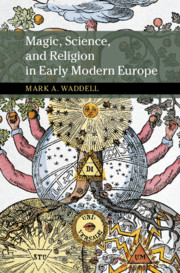Book contents
- Magic, Science, and Religion in Early Modern Europe
- New Approaches to the History of Science and Medicine
- Magic, Science, and Religion in Early Modern Europe
- Copyright page
- Dedication
- Contents
- Figures
- Acknowledgments
- Introduction
- 1 Hermeticism, the Cabala, and the Search for Ancient Wisdom
- 2 Witchcraft and Demonology
- 3 Magic, Medicine, and the Microcosm
- 4 A New Cosmos
- 5 Looking for God in the Cosmic Machine
- 6 Manipulating Nature
- 7 A New World?
- Conclusion
- Bibliographical Essays
- Index
5 - Looking for God in the Cosmic Machine
Published online by Cambridge University Press: 22 January 2021
- Magic, Science, and Religion in Early Modern Europe
- New Approaches to the History of Science and Medicine
- Magic, Science, and Religion in Early Modern Europe
- Copyright page
- Dedication
- Contents
- Figures
- Acknowledgments
- Introduction
- 1 Hermeticism, the Cabala, and the Search for Ancient Wisdom
- 2 Witchcraft and Demonology
- 3 Magic, Medicine, and the Microcosm
- 4 A New Cosmos
- 5 Looking for God in the Cosmic Machine
- 6 Manipulating Nature
- 7 A New World?
- Conclusion
- Bibliographical Essays
- Index
Summary
In the 1630s, two different men proposed new and potentially powerful ways of understanding the natural world. Pierre Gassendi (1592-655) and René Descartes (1596-650) each devised a system that sought to explain all natural phenomena as the result of the movement of matter. Historians now call these the mechanical philosophies of nature, and they represent an important shift in early modern ideas about the world. Gassendi revived the ancient atomism of Epicurus (341–270 BCE) while Descartes envisioned a cosmos filled with swirling vortices of tiny particles, but despite the many differences between their philosophies, both struggled to answer the same question: How can we explain God, the human soul, and life itself in a mechanical universe? This was not a small problem, as many in the seventeenth century worried that reducing all things to the movement of matter could lead to doubt, skepticism, and even outright atheism. Both Gassendi and Descartes found ingenious ways to establish proofs for the presence of God in their philosophies, and also reconciled the very essence of what it means to be human — to them, the immortal soul — with a purely material universe.
- Type
- Chapter
- Information
- Magic, Science, and Religion in Early Modern Europe , pp. 135 - 160Publisher: Cambridge University PressPrint publication year: 2021

